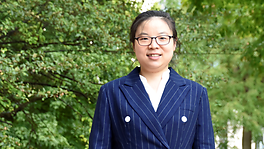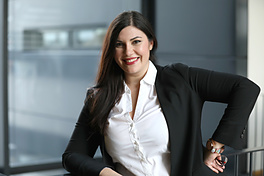Questions and Answers
Being a Researcher at the MPIDR

© iStockphoto.com/g-stockstudio
Researchers at the Max Planck Institute for Demographic Research (MPIDR) answer very practical questions about every-day life in Rostock and their work at the Institute. What is life like here with a family? What do I have to consider when I move to Rostock? How do I meet new people? All these questions are answered on this page.

© courtesy of Emma Zai
Emma Zai started working as a research scientist at the MPIDR last summer, after finishing her PhD at the Ohio State University in early 2021. She is interested in the economics of aging and health economics. Emma uses large secondary datasets and research designs to estimate the causal effects of public policy on individual behavior and outcomes.
How is it to move to Rostock from abroad?
It was smooth. I did homework on international shippers and shopped around choosing FedEx with good services and affordable price. I packed for about two weeks before moving. Each day I cleaned some, packed some, and gave away or threw away some. It did take some time organizing and packing, but it was also relaxing and fun. Overall, my advice for a move across national borders is to plan early!
How does one get to know people?
During the pandemic, it is difficult to meet people outside work. But colleagues at work are great. We have lunch together if Covid regulations allow. I get to know a lot of interesting staff members at our Institute who have so many things to share. Besides work, if you want to find new people, there are some groups of interest on eBay; so, you can reach out and join their club (German is required, though, I think). I also notice that there are some yoga or dance classes in the city center. You can buy classes and get to know new people there.

© MPIDR
Angela Carollo moved to Rostock in 2015 to work at the MPIDR as statistician. Since 2018 she is working on her PhD thesis about survival analysis and more complex event history models. In particular, in her research, Angela is working on models for estimating the hazard of an event that depends on multiple time scales.
What is every-day life like in Rostock?
Since I moved to Rostock in 2015, I had the opportunity to experience the city under different circumstances, and I can tell that Rostock offers the possibility to live a quite nice every-day life. Almost everything is in walking-distance and the public transportation system is really efficient, so small commutes are no problem and there is almost no risk of getting stuck in traffic. On sunny days it is lovely to walk along the riverside, explore one of the many parks around the city center or visit the seaside of Rostock, Warnemünde. I came to appreciate the city even more since I became a mother last year because Rostock is a kid-friendly city, with lots of playgrounds, parks and offers for young parents.
What are the big cities close to Rostock?
The closest big German cities are Hamburg and Berlin, which are connected to Rostock by direct trains. I also love a day-trip to Stralsund, which is a lovely port town one hour from Rostock. There, my husband Christian and I always visit the Ozeaneum, a public aquarium and the German Oceanographic Museum.
Do I need a car?
Most likely: No. I have been living in Rostock for more than six years now, and I don’t have a car. The public transportation system works really well, allowing you to go anywhere in a reasonable amount of time and for a few euros. If you live close by the city center, you have access to everything you might need by just walking. In addition, there are car-sharing companies operating in Rostock, if you really need a car for your trip to IKEA, for example.
What is your survival tip for Rostock beginners?
Do a little bit of research about the city and what you might need, and do not be afraid to ask your fellow colleagues at the Institute for tips. Learn a little bit of German, to make the communication with locals easier. But most importantly: Remember that supermarkets and stores are closed on Sundays and on public holidays, so plan ahead.

Diego Alburez-Gutierrez has a PhD in Demography from the London School of Economics, and is employed as a Research Scientist at the MPIDR since 2019. From May 2022 he will head the Max Planck Research Group: Kinship Inequalities. He specializes in inter-generational demography. His work uses mathematical modeling, micro-simulation techniques, and empirical analysis to explore changes in the experience of life events such as kin availability, family bereavement, and caring responsibilities around the world.
Get to know Diego and his work and watch his video on Twitter.